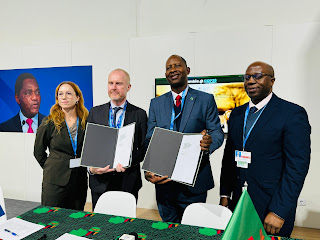VIOLET MENGO
Lusaka: THE 29th
session of the Conference of the Parties (COP29) has seen Zambia witnessed two landmark
events towards article six cooperation of the Paris Agreement and
continued action towards climate change.
Minister of Green
Economy and Environment (MGEE) signed bilateral agreements with Norway and
Sweden at COP29 in Baku,
Azerbaijan under its current engagement with buyer countries for
carbon credits.
On November 16, 2024, Government
signed a bilateral agreement
for Article 6 Cooperative Approaches with Norway.
 |
| Mike Mposha (left) with Mr Sandvik |
The agreement was signed by Norwegian Minister of Climate
and Environment Mr Tore Onshuus Sandvik and Zambia’s Minister of Green Economy
and Environment, Mike
Mposha.
The event was graced by other officials from both parties
and supporting intergovernmental agencies at a momentous occasion that signifies
cooperation towards climate action, emission reduction and achieving of global
targets.
Norwegian Minister of Climate and Environment, Mr Sandvik said that Norway believes cooperation
under Article 6 can provide much needed finance for green investments in
developing countries.
“Today,
our countries are taking a major leap forward, paving the way for green
investments in Zambia and a contribution to global mitigation ambitions,” he said.
Mr Mposha,
the event was as a culmination of our respective
preparations and efforts to ensure that we reach this milestone agreement.
On November 18, 2024 Government represented by the Permanent
Secretary of the Ministry of Green Economy and Environment, Dr Douty Chibamba
signed a bilateral agreement with Sweden’s Swedish Energy Agency.
The
event came
after months of engagement with Sweden, including the signing of a Memorandum
of Understanding (MoU) in August 2024 in Lusaka.
 |
| Zambia and Sweden |
The Swedish Energy Agency is one of Sweden’s key expert
government agencies which promotes energy efficiency measures and investments
in renewable energy technologies and is mandated to implement climate cooperation under Article 6 of the Paris Agreement.
Acting Director General of the Swedish Energy Agency Caroline Asserup, who
signed on behalf of the government of Sweden said
“This bilateral cooperation agreement is an important step towards establishing
concrete climate projects that reduce greenhouse gas emissions, contribute to
sustainable development and help raise climate ambition in both Sweden and
Zambia. We are pleased to further strengthen the cooperation between our two
countries.”
Mr Mposha,
was one of the many dignitaries attending the signing ceremony.
He said “Our government is serious about participating in
international carbon markets as an important avenue to achieve our nationally
determined contributions, generate new carbon finance revenue streams, which
will increase the country’s mitigation ambition and contribute to the
sustainable development of our nation.”
The minister acknowledged
both the Norwegian and the Swedish governments for their continued commitment
towards climate action.
He further added that signing of the bilateral agreements
would help Zambia as it opens up opportunities for public and private sector
energy project developers to access carbon finance and pursue renewable energy
power generation.
Both events were supported by the Supporting Preparedness
for Article 6 Cooperation (SPAR6C) Program, led by the Global Green Growth
Institute (GGGI) with GFA Consulting Group and UNEP Copenhagen Climate Centre
as the leading delivery partners in Zambia.
SPAR6C aims to catalyze investment in greenhouse emissions
reductions by supporting its implementation countries to enable transactions of
Internationally Transferred Mitigation Outcomes (ITMOs) as allowed under
Article 6 of the Paris Agreement.
Over the past two years, Zambia has progressed in the development
of its carbon market framework and is in the process of developing first
mitigation activities with the support of SPAR6C.
The Paris Agreement, signed by 197 countries in 2015,
represents a historic global effort to combat climate change by limiting global
warming to well below 2 degrees Celsius above pre-industrial levels. Article 6
of the Paris agreement is the cornerstone for international cooperation,
fostering global carbon market mechanisms that enable countries to reduce
greenhouse gas emissions while fostering sustainable development.
Zambia is currently facing an energy deficit due to a
combination of factors including a growing demand for electricity and limited
investments in the energy sector.
These factors coupled with a severe drought and high
dependence on hydropower, have
drastically affected the capacity of its hydroelectric power plants to generate
sufficient power to support economic growth.
Government, through the Ministry of Energy and the
Ministry of Green Economy and Environment, have been seeking alternatives and
exploring renewable energy and energy efficiency options to support the
country’s efforts in power generation and low carbon power sector development.

No comments:
Post a Comment